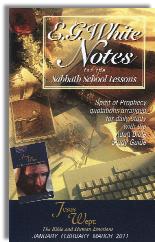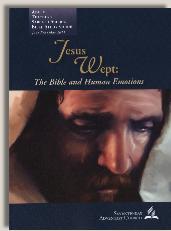|
||||||||||||||
Commentary on "Divine Provision for Anxiety""
Day 3: Monday, January 3, 2011 - Do Not Be Afraid
Overview
Genesis 15:1-3, where God instructs Abram to not be afraid, sets the theme for today’s lesson. God says to him that “I am your shield and your reward”. God has promised that he will be the father of a great nation and Abram is concerned because he continues to be childless in his old age.
The lesson then lists several verses where the student is asked to outline the circumstances under which the Lord’s message is “do not be afraid”. First, we will briefly examine those verses then we will explore the faith of Abram that leads up to when God changes his name to Abraham, meaning ‘father of a multitude of nations’.
Observations
In Deuteronomy 31:8 the Israelites are about to enter the Promised Land, at which time, they learn that they will do so without the leadership of Moses. In Second Chronicles 20:17 powerful enemies have come up against King Jehoshaphat. In Luke 21:9 Christians are told that when they hear of wars and tumults to not be terrified. Finally, in John 14:27 Jesus promises peace, but that it will not be as the world gives it. In all cases the circumstances are totally out of the control of those who are in danger. Their reason for having nothing to fear is completely and solely dependent upon the power and providence of a loving God.
Since both the Old Covenant God made with Israel and the New Covenant Jesus announced to those who would be called Christians was based upon the ‘faith of Abraham’ and the promise made to Abraham, it is appropriate that we return and examine both Abraham’s fears and his faith.
By faith Abraham obeyed when he was called to go out to a place which he was to receive for an inheritance, and he migrated without any idea where he was going. By faith he lived in the land of promise as in a foreign country, living in tents, as did Isaac and Jacob who were joint heirs with him of the same promise. For he was looking for the city with foundations, whose Architect and Builder is God. Also by faith Sarah herself received power to conceive and that when she was past the normal age, because she regarded the One who promised to be trustworthy. And so from one person, and he already impotent, there were born descendants as the stars of heaven in numbers and countless as the sand on the seashore. These all died in faith without having received what was promised them, but they saw it from a distance and welcomed it, confessing that they were foreigners and exiles on the earth. (Heb 11:8-13 MLB)
The bible reveals how Abraham displayed by his actions both faith and fear. Even as he expressed his fears he believed the words and promises of God.
Let’s turn to Romans chapter four where Paul declares that Abraham “believed God and it was counted to him as righteousness” in verse three. In verse eleven we learn that circumcision was a sign of the righteousness that he had by faith. Verses 13 through 18 then demonstrate why “righteousness by faith” has nothing to do with the keeping of the law, something that didn’t even exist in Abraham’s day. Next, Romans 4:19-25 refer to events recorded in Genesis 17:15 through 18:15.
And God said to Abraham, “As for Sarai your wife, you shall not call her name Sarai, but Sarah shall be her name. I will bless her, and moreover, I will give you a son by her. I will bless her, and she shall become nations; kings of peoples shall come from her.” Then Abraham fell on his face and laughed and said to himself, “Shall a child be born to a man who is a hundred years old? Shall Sarah, who is ninety years old, bear a child?” (Gen 17:15-17 ESV)
So Sarah laughed to herself, saying, “After I am worn out, and my lord is old, shall I have pleasure?” The Lord said to Abraham, “Why did Sarah laugh and say, ‘Shall I indeed bear a child, now that I am old?’ Is anything too hard for the Lord? At the appointed time I will return to you, about this time next year, and Sarah shall have a son.” But Sarah denied it, saying, “I did not laugh,” for she was afraid. He said, “No, but you did laugh.” (Gen 18:12-15 ESV)
Paul cites the time in Abraham’s life where both he and Sarah laughed at the announcement that they would have a son as the moment when he did not weaken in his faith. Both Abraham and Sarah were far too old and helpless to have any part in God fulfilling his promise of a son.
He did not weaken in faith when he considered his own body, which was as good as dead (since he was about a hundred years old), or when he considered the barrenness of Sarah’s womb. No distrust made him waver concerning the promise of God, but he grew strong in his faith as he gave glory to God, fully convinced that God was able to do what he had promised. That is why his faith was “counted to him as righteousness.” (Romans 4:19-22 ESV)
What does this have to do with being without fear or anxiety? The answer is very simple and foundational of how each of us, as Christians, can be without any fear. When Abraham fully understood that there was nothing he or Sarah could do in “partnership with God” to help God keep God’s promise, his faith was free of any fear. There was nothing he could do or fail to do to limit or prevent God from fulfilling what God promised to do.
Summary
- Abraham believed God and it was counted to him as righteousness. When he fully realized that there was nothing he could do to “work in partnership” with God to help God keep his promises, all fear was removed and replaced with trust in the providence of God.
- For those who honestly believe they must do something to secure their salvation or that their good deeds must be enough to pass an Investigative Judgment to earn the right to join the kingdom of God must live with the very real fear that their good deeds fall short of the perfect righteousness requirements of a holy God.
- All our fears and anxiety can only be removed when, through the same faith that Abraham had, believe and accept the completed atoning work of salvation Jesus accomplished upon the cross. Not until we understand Jesus has been seated at the side of the Father since his death, burial, resurrection and ascension into heaven nearly two thousand years ago, can we just like Abraham have peace and freedom from fear and anxiety.
- Fear and anxiety are a common characteristic of all those who live in this fallen world. It may be related to many different causes, real or imagined, but for those who have placed their trust in the promises of God there is nothing to be fear, Romans 8:31-39.
Copyright 2010 BibleStudiesForAdventists.com. All rights reserved. Revised December 28, 2010. This website is published by Life Assurance Ministries, Glendale, Arizona, USA, the publisher of Proclamation! Magazine. Contact email: BibleStudiesForAdventists@gmail.com.
The Sabbath School Bible Study Guide and the corresponding E.G. White Notes are published by Pacific Press Publishing Association, which is owned and operated by the Seventh-day Adventist church. The current quarter's editions are pictured above.
Official Adventist Resources
Standard Edition Study Guide Week 2
Teacher's Edition Study Guide Week 2
Easy Reading Edition Study Guide Wk 2
Search the Complete Published Ellen G. White Writings


